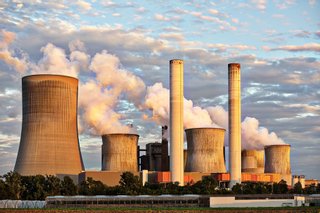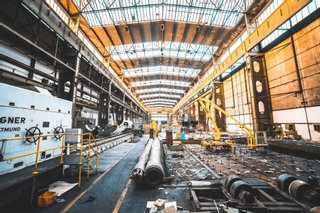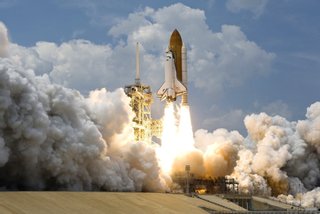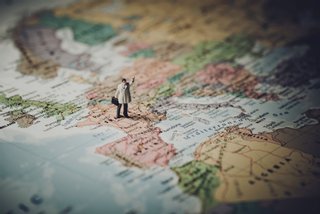Space vs AI double race: A balancing dance humanity has to take
June 17, 2019
As the dusk was about to set in, I laid back in my college bus seat, plugging in my earphones, listening to Illayaraja’s “Poove sem poove” while trying to retrospect of what the day has been. My tired mind slowly slipped back to the thought I had the previous day; Should AI take our jobs? What happens if it does?
This is not yet another fear mongering about AI, in fact I personally believe humanity needs AI to sustain itself with growing population and demands (It is a bit counter intuitive to think about, I’ll explain in a bit)

Let’s take a moment and think what will happen in the next 100 or 1000 years? Now predicting that far ahead is astoundingly difficult since there will be numerous variables to factor in, but it is not unfruitful to give it a try. It will give us some direction, stretch our imagination and make us rethink our status quo.
A caveman from the stone age cannot fathom the smartphone lying in your hand, let alone how a man made object; Voyager is travelling out of our solar system, deep into interstellar space as we speak. But we have to, right? Every period in humanity has some people who dreamt that far ahead or fundamentally different. Now on top of my head comes Newton, Einstein, Tesla, Marie Curie and not just scientists but artists like Jules Verne, Issac Asimov, etc and not to mention polymaths like Da Vinci.

Here is my two cents,
With advancements in Medical sciences, quality of life and its expectancy is set to sore. Already, this has given rise to cures for large number of diseases. People around the world, around the clock are actively trying to find a cure for cancer, HIV, Alzheimer's, etc. There are companies and think tanks out there which are figuring out a way to slow down aging. People are figuring out how to mass manufacture organs that could be used for ‘elective’ transplantations. People get new organs when what they already have fails i.e they are terminally ill and without the new organ they will be met with a sure death or because of their organ failure; their living standard is extremely low. But in future, there might come a point where an old, otherwise healthy 85 year old person can buy a brand new heart that can in probability be healthy for another 70 years. Similarly the person could replace other organs and with proper medical technology, might outlive natural death.
Advancements in technology have come a long way from where they used to be at the turn of the millennium. We still have a long way to go before we reach a point known as ‘singularity’ from where computer (or artificial) intelligence will have equal if not more cognitive ability of that of a human.
In extremely distant future, your consciousness could be uploaded onto a digital vessel from its biological vessel. How will the next set of humans be produced, if at all the process is actually needed then? What sort of law will come into action, when natural selection and gene passing is no more? But this is for another topic.
Up until a few decades ago, medical advancements was all about trying to cure the ill. But with the growing trend in improving the wellness of already healthy people, the scope is spreading from illness to wellness too. As an example for this, Plastic surgery which was once mostly used for helping people with burnt skin or similar issues, now is being used by healthy people as a means to improve their appearance. In all normal cases, they elect to do the procedure instead of it being the only option. A case where a woman, who underwent mastectomy to fight breast cancer, opting for a breast implant is different from a healthy woman who opts for it, for the sake of improving her appearance. Be Cautious, I am no one to judge, I shouldn't. If there is technology in medicine which allows me to have an eidetic memory, I will opt for it, even though I already have a decent level of intelligence. If there is nothing wrong with this, then there is nothing wrong with that. This example is just to illustrate that the scope of medical science is slowly spreading from curing illness to improving the wellness of the already healthy.

Thomas Maltheus, from who ‘Malthusianism’ was coined, made a prediction in 1798 that the supply of energy (which includes food, as food is also an energy) won’t keep up with the growing demand for energy by humans. He predicted that the world will undergo a major famine in the mid 19th century.
However, when we look into history, there occurred no global famine of that sorts. What happened? Thomas Maltheus maybe was right during his time, but he made the prediction considering humanity will always be an agriculture based economic society. Maybe, He never considered that industries will boost agriculture production, other services and breakthroughs in technology will help keep up with the demand for energy.

An average person living today has a better living standard than an average king of past. So, with all of these advancements in technology, people will most likely outlive natural death or at least have a long lifespan. This will lead to overcrowding and a resource crunch. There will be difficulties in scaling population in a sustainable manner. This statement may sound similar to what Maltheus made two centuries ago so, I am going to leave room for some hypothetical set of technologies that will solve all of this. These technologies could be anything, for instance, one of the technologies could make the human body harvest energy from the sun directly instead through digestion of food thus, eliminating the need for food altogether.
Before proceeding, for those of you who are not familiar with Kardashev scale, it ranks the level of a civilization based on the amount of energy it is able to capture and put to use. The original scale classifies them into three types,
- Type 1 - Uses all the energy available on the planet
- Type 2 - Uses all the energy available from the parent star
- Type 3 - Uses all the energy from all the stars in the parent galaxy
Introducing ‘The synaptic cycle of techno-economy scaling‘ (PS: if it is too big or too fancy to remember, you can opt to call it ‘The Lokesh Prabakaran scaling’ or simply ‘The LP scaling’ :P),
- Whenever humanity’s population scales up due to factors like breakthrough in technology.
- Economic activity increases to keep up with it.
- Energy (among other resources) needs increases to keep up with the increased economic activity.
- Technology is pressured to keep up with the raising demands to ensure sustainability which leads to breakthroughs, which in turn not only increases the living standards of population but also the size of the population as well thus, repeating the cycle from step 1.

I am going to focus on two areas of technology here, the race between AI advancement and Space technology, especially space travel and colonization ( which includes terraforming )
- AI development takes the lead than space technology, i.e A true AI is achieved when Humanity is still confined to the resources of one planet.
- Space technology takes the lead than AI development i.e humanity becomes a multi-planetary or better yet multi-galactic species before a true AI is developed.
- Both are balanced.
Let's talk case by case,
The first case is where AI development takes the lead.
It means that Humanity, in this case will have a truly powerful AI while still being confined to the resources of one planet. This is where most of the fear mongering comes, that when machines acquire the ability to have cognition to the level of a human if not more, most if not all of the jobs can then be easily handled by machines. It would disrupt plethora of industries and bring about lot of socio-cultural and socio-economic changes and maybe even evolutionary changes as well.
Think of a workforce completely made of machines even white color jobs. What we will do with the surplus population? Which in all probability in this case will be the entire population. A world carved by humans where the humans they themselves have no purpose?
For those of you who are not familiar with industrial revolutions; in simple words it transformed the economic epicenter of humanity from an agricultural to an industrial society. It is one of the reasons, or a catalyst for the population sprout of humans. It is what helped us stop the dreaded prophecy made by Maltheus, couple of centuries ago.

Industrial revolution is split into four phases, the fourth one is happening now. The third one is what we are going to consider, it introduced automatons and robots to the industrial world. The effect? Assume that a textile mill once needed 5000 people to run and produce goods, the same mill with the help of automatons and robots can produce goods at a even more high velocity and high volume with less workforce like 500.
What this means for the 4500 surplus workforce? I imagine that this surplus workforce made it possible to open more factories, thus increasing the economic activities’ baseline. In another analogy, battleships during the great two world wars required more crew to function than the modern day destroyers which is far more powerful and efficient than them.
So, up until this point the surplus population still had a use; they enabled scaling (both horizontal and vertical) of our economy. But what would happen when industries further cut it short? Imagine a steel industry which requires only 10 persons and a powerful Artificial Intelligence to function, what would happen to society then? This is very much plausible, maybe not in the immediate decades but certainly in future. Would scaling improve society then too?
Visionaries like Bill Gates suggests that the AI and robots which takes our jobs should pay tax. This might sustain our current economic framework but a person basically gets paid a fixed value in-spite of zero contribution to the society by them. Imagine a capitalistic system used to fund and operate a socialistic system. What humans of that hypothetical world do on weekdays; perhaps all weekdays will be same as weekends are now for most people; they chill and relax? Sounds utopic, right? Hold your thoughts.
With medical advancements, population will skyrocket. It would become unsustainable to meet the energy demands of humanity. Of course, since we assumed that in this hypothetical scenario, Humans would have developed a powerful AI, it can help solve our issues with scaling but what about purpose?
Based on historical retrospection, a group of people who have an early access to technology like this might gain control of resources and might do away with the surplus population as they serve no purpose. For now, we all need each other to live in a direct or indirect way. That is what society is. Rich, middle class and poor all need each other. A rich person living in the 21st century still needs a workforce to implement his/her idea. Yes, he/she needs a little workforce when compared to his/her counterpart of the 17th century. What about his/her counterpart in the upcoming centuries? In all probability, they only need a very minuscule team of people to run operations on grand scale; AI will assist them in a huge way.


So, what purpose does the rest of the population serves? We should keep in mind that, all of this will not happen overnight, it takes decades if not centuries to bring this into reality. So if AI takes the lead, and medical advancements soar through and if it is available to the majority of the population, the world will be become overcrowded with redundant population who serve no special purpose. Taxing of AI systems might prove to be one solution, but still that won’t be an optimal use of available resources as the surplus population will simply consume energy while serving no purpose.
Now, let’s talk about case two where space technology takes the lead than AI technology.
It means that humanity will be a multi-planetary or better yet multi-galactic species before a true AI is developed. By space technology I refer to the means to not only travel between the planets in our solar system but across galaxies and also be able to setup connected colonies. In other words, the peak of space technology will do what globalization did to the society; it made the world a global village, space technology will make the universe a village.


Imagine knowing in real time about what is happening in a colony on a planet located somewhere in Andromeda galaxy; or imagine a couple in a long distance relationship chatting with each other via augmented reality technology that is connecting them across galaxies. They plan out their next meet in some galaxy to the north of them, known for its tourist attractions on its hauntingly beautiful resort planets. They book tickets to travel to the place via an intergalactic shuttle service. All of this sounds sci-fi, right? But look around, things that were once only in sci-fi is within our reach; smartphone is a good example.

Now, humanity will have very less chance to reach this level of settlements without developing a true AI. Humanity needs true AI to not only achieve these breakthroughs but to run things as well. It is going to be very difficult if not highly improbable to run operations spanning across galaxies without the help of AI system(s). Technology, especially computing technology is what made the globalized economy efficient. Sophisticated algorithms plan logistics to the minute, monitor resources, etc. All of this helps companies go global in-spite of distance. A company in USA can know about the state of its production line in Southeast Asia in real time; This might help them plan things out. This ability might sound trivial now, but a couple of centuries ago it was not so.
Similarly imagine a company spanning across galaxies, how would the stakeholders control assets and operations? When it comes to intelligence resources, Human intelligence alone will not suffice, computer (artificial) intelligence is much needed in scenarios like this.
Also note that if space technology reaches this level, the surplus population problem is solved (At least for some good duration of time).The surplus population can then be used to settle colonies across galaxies, i.e scaling our economy from single-planetary to multi-planetary and eventually to multi-galactic economies.

For a moment forgot about connecting galaxies, imagine connecting all colonies in the solar system. Do we really believe that human intelligence alone will suffice to control operations of that scale? I beg to differ.
Starting to see the problem? AI taking lead might lead to a social collapse if humans are still confined to the resources of a single planet, but it will be very difficult to scale our civilization to multiple planets let alone to multiple galaxies without a true AI.
What is the solution to all of this? The third case i.e a balance.

Humanity will in all probability undergo a balancing dance between these two technological double race to scale well. If we focus too much on AI development with less focus on space technology, the problems discussed in case 1 might happen. On the other hand, if we focus too much on space technology, we won’t be able to sustain its growth without a true AI. There has to be a balance.
The number of startups and innovations in AI technology is far greater than the number of startups and innovations in space technology. Maybe this ratio will do good for now, but it is high time we start calibrating this ratio.
Live long and prosper, and this too shall pass!
